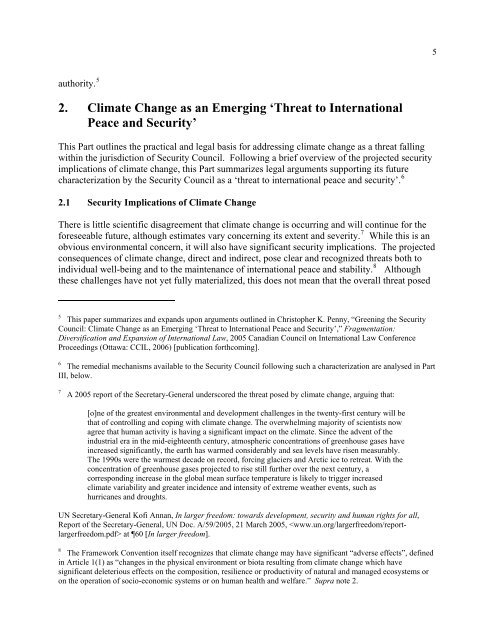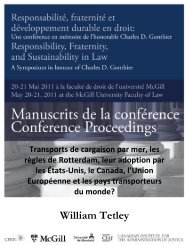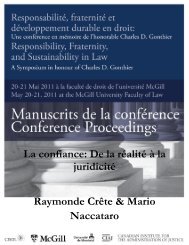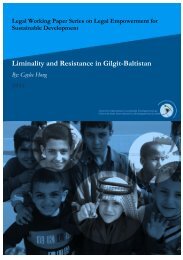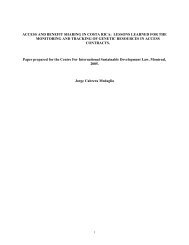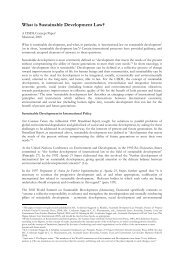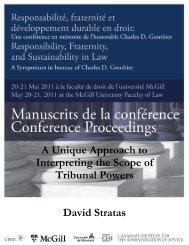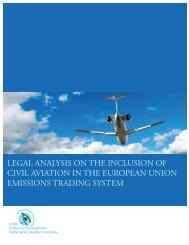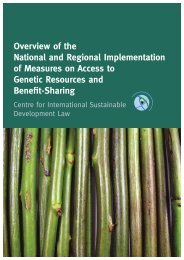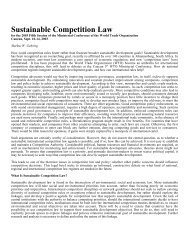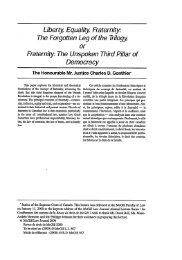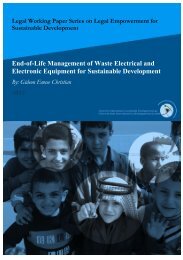Climate Change and the Security Council - CISDL
Climate Change and the Security Council - CISDL
Climate Change and the Security Council - CISDL
Create successful ePaper yourself
Turn your PDF publications into a flip-book with our unique Google optimized e-Paper software.
5<br />
authority. 5<br />
2. <strong>Climate</strong> <strong>Change</strong> as an Emerging ‘Threat to International<br />
Peace <strong>and</strong> <strong>Security</strong>’<br />
This Part outlines <strong>the</strong> practical <strong>and</strong> legal basis for addressing climate change as a threat falling<br />
within <strong>the</strong> jurisdiction of <strong>Security</strong> <strong>Council</strong>. Following a brief overview of <strong>the</strong> projected security<br />
implications of climate change, this Part summarizes legal arguments supporting its future<br />
characterization by <strong>the</strong> <strong>Security</strong> <strong>Council</strong> as a ‘threat to international peace <strong>and</strong> security’. 6<br />
2.1 <strong>Security</strong> Implications of <strong>Climate</strong> <strong>Change</strong><br />
There is little scientific disagreement that climate change is occurring <strong>and</strong> will continue for <strong>the</strong><br />
foreseeable future, although estimates vary concerning its extent <strong>and</strong> severity. 7 While this is an<br />
obvious environmental concern, it will also have significant security implications. The projected<br />
consequences of climate change, direct <strong>and</strong> indirect, pose clear <strong>and</strong> recognized threats both to<br />
individual well-being <strong>and</strong> to <strong>the</strong> maintenance of international peace <strong>and</strong> stability. 8 Although<br />
<strong>the</strong>se challenges have not yet fully materialized, this does not mean that <strong>the</strong> overall threat posed<br />
5<br />
This paper summarizes <strong>and</strong> exp<strong>and</strong>s upon arguments outlined in Christopher K. Penny, “Greening <strong>the</strong> <strong>Security</strong><br />
<strong>Council</strong>: <strong>Climate</strong> <strong>Change</strong> as an Emerging ‘Threat to International Peace <strong>and</strong> <strong>Security</strong>’,” Fragmentation:<br />
Diversification <strong>and</strong> Expansion of International Law, 2005 Canadian <strong>Council</strong> on International Law Conference<br />
Proceedings (Ottawa: CCIL, 2006) [publication forthcoming].<br />
6<br />
The remedial mechanisms available to <strong>the</strong> <strong>Security</strong> <strong>Council</strong> following such a characterization are analysed in Part<br />
III, below.<br />
7<br />
A 2005 report of <strong>the</strong> Secretary-General underscored <strong>the</strong> threat posed by climate change, arguing that:<br />
[o]ne of <strong>the</strong> greatest environmental <strong>and</strong> development challenges in <strong>the</strong> twenty-first century will be<br />
that of controlling <strong>and</strong> coping with climate change. The overwhelming majority of scientists now<br />
agree that human activity is having a significant impact on <strong>the</strong> climate. Since <strong>the</strong> advent of <strong>the</strong><br />
industrial era in <strong>the</strong> mid-eighteenth century, atmospheric concentrations of greenhouse gases have<br />
increased significantly, <strong>the</strong> earth has warmed considerably <strong>and</strong> sea levels have risen measurably.<br />
The 1990s were <strong>the</strong> warmest decade on record, forcing glaciers <strong>and</strong> Arctic ice to retreat. With <strong>the</strong><br />
concentration of greenhouse gases projected to rise still fur<strong>the</strong>r over <strong>the</strong> next century, a<br />
corresponding increase in <strong>the</strong> global mean surface temperature is likely to trigger increased<br />
climate variability <strong>and</strong> greater incidence <strong>and</strong> intensity of extreme wea<strong>the</strong>r events, such as<br />
hurricanes <strong>and</strong> droughts.<br />
UN Secretary-General Kofi Annan, In larger freedom: towards development, security <strong>and</strong> human rights for all,<br />
Report of <strong>the</strong> Secretary-General, UN Doc. A/59/2005, 21 March 2005, <br />
at 60 [In larger freedom].<br />
8<br />
The Framework Convention itself recognizes that climate change may have significant “adverse effects”, defined<br />
in Article 1(1) as “changes in <strong>the</strong> physical environment or biota resulting from climate change which have<br />
significant deleterious effects on <strong>the</strong> composition, resilience or productivity of natural <strong>and</strong> managed ecosystems or<br />
on <strong>the</strong> operation of socio-economic systems or on human health <strong>and</strong> welfare.” Supra note 2.


